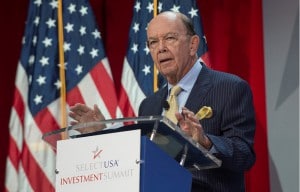
Commerce Secretary Wilbur Ross said President Donald Trump is considering levying a tariff on imported automobiles and parts.
In Washington D.C. a deadline is not really a deadline, which makes sense since the Commerce Department recently declared a Mini Clubman poses a significant risk to national security.
The deadline referenced was the recently expired time limit that the Trump administration had to impose a tariff on imported autos under Section 232 of the Trade Expansion Act of 1962.
Wilbur Ross, the U.S. Secretary of Commerce, led an investigation that found that imported vehicles did represent a risk the security of the United States, thus President Donald Trump could levy a tariff on them. Trump threatened to smack vehicles from Europe and other places with a 25% tariff if they didn’t start building more vehicles in the United States.
(Trump misses deadline – loses authority to impose tariffs on European, Japanese cars)
There was a deadline to do so and he missed it; however, U.S. officials are still pushing foreign automakers to change the way they do business with the U.S.
 “We’ve been having negotiations with the individual companies. We’ve had some very good benefits from that,” Ross told Reuters in New York. “It may or may not turn out that there is any need for the tariff.”
“We’ve been having negotiations with the individual companies. We’ve had some very good benefits from that,” Ross told Reuters in New York. “It may or may not turn out that there is any need for the tariff.”
Ross also told Reuters that Trump could still slap a levy on them anyway despite a U.S. trade court ruling that was issued last month confirming the president’s authority to impose sanctions has lapsed.
That caused at least one member of Congress, U.S. Senator Pat Toomey (R-Pennsylvania) to cry foul, suggesting in a tweet that the Commerce Department would need to a launch a new investigation before it could impose the tariffs.
Ross believes otherwise, suggesting it was theoretically possible that Washington could use tariffs authorized by the World Trade Organization under a separate case about aircraft subsidies to impose tariffs on European car imports.
(Threat of auto tariffs could scuttle Trump’s trade deal with Japan)
But he declined to say if the administration was considering that move, but the administration has been negotiating with various countries, such as China and Japan, seeking what it views as a more equitable trading relationship, especially when it comes to auto imports.
Ross pointed out the European Union imposes a 10% tariff on U.S. cars, while the U.S. imposes a 2.5% tariff on EU cars. Japan also imposes a significantly higher tariff on imported U.S. vehicles than this country does to Japanese imports.

European Commission President Jean-Claude Juncker, left, and President Donald Trump met last year to discuss a new trade deal.
“There has already been a tariff war. The only thing is we haven’t been defending ourselves. We’ve been accepting the lopsidedness of things,” Ross told Reuters.
However, Toomey noted the administration recently “announced its intention to restore tariffs on Argentinian and Brazilian steel and aluminum,” but pointed out Section 232 is designed to be used for national security threats.
Criticizing Trump, he said the president admits “the real purpose of this action is to combat currency manipulation — which does not pose a national security threat.” He added that, as previously mentioned, the window to do that has closed.
(With China trade deal again delayed, Trump expected to hold off on new Japan, EU tariffs)
“These actions further underscore that Congress should take up my legislation that would reassert congressional authority regarding imposition of national security tariffs,” he tweeted.
